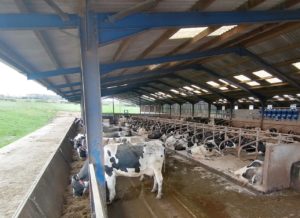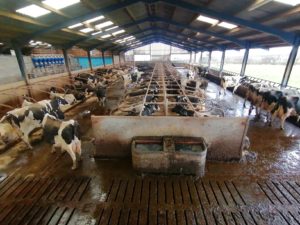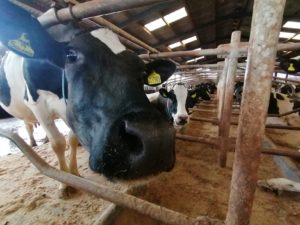 Fourth-generation sons Chris and Matt, along with their father David Barton run a high yielding herd of just under 100 cows over 230 acres in Lancashire. This 11,600L herd’s rolling 12-month constituents are 4.2% butterfat and 3.25% milk protein, resulting in the family being awarded the Harold Jackson Challenge Cup Champion Cow at the Lancashire Milk Records. The award is for the highest weight of fat and protein over three lactations and where the cow in question, who is coming up 11 years old and well into her 8th lactation is producing 46L/ day at 4.27 BF, and 3% protein. She has produced 120 tonnes so far!
Fourth-generation sons Chris and Matt, along with their father David Barton run a high yielding herd of just under 100 cows over 230 acres in Lancashire. This 11,600L herd’s rolling 12-month constituents are 4.2% butterfat and 3.25% milk protein, resulting in the family being awarded the Harold Jackson Challenge Cup Champion Cow at the Lancashire Milk Records. The award is for the highest weight of fat and protein over three lactations and where the cow in question, who is coming up 11 years old and well into her 8th lactation is producing 46L/ day at 4.27 BF, and 3% protein. She has produced 120 tonnes so far!
Youngstock
The future herd starts from the calf. Park Farm rear all their replacements, ensuring these are healthy and productive which is a no-brainer for future business performance.
To the best of their efforts, every calf gets 4 litres of colostrum within the first 4 hours of life, “we test the colostrum and understand the importance of this to the future performance of that individual, hence why we try and give the first feed within those 4 hours” says Chris.
Automatic feeders are installed at Park Farm, “we get on really well with them, as long as you look after them. Hygiene is a massive factor to the calf performance which is something we make a point of managing” Chris comments. Clear protocols are followed on the farm and with regards to cleanliness, teats are changed daily. They are soaked in disinfectant, rinsed and put on the feeder. “If there is a calf which isn’t doing too right and we miss it, the whole pen can go down like a domino effect!” Chris comments.
 The farm has good relations with Oakhill Farm Vets who come and weigh the calves, in addition to making sure they are up to date with vaccines. The vets also take blood for total proteins which highlight passive immunity, helping to ensure the team at Park Farm is doing their best to promote calf immunity and therefore health.
The farm has good relations with Oakhill Farm Vets who come and weigh the calves, in addition to making sure they are up to date with vaccines. The vets also take blood for total proteins which highlight passive immunity, helping to ensure the team at Park Farm is doing their best to promote calf immunity and therefore health.
Dry Cows
The dry period is another area where tweaks have been made to support the cows. “We were getting incidences of ketosis and retained cleansing, which prompted a discussion with Joe, and to tweak the drys diet”.
Since feeding NWF’s DryTime, 3 weeks prior to calving, the farm has seen a reduction in metabolic incidences which not only help reduce treatment costs but also supports the following lactation. Joe White, NWF’s Sales Manager comments that “this is important for any dairy farm, especially at Park Farm as they are a high yielding herd therefore this tweak has been critical in maintaining that peak and supports the overall health of the cows”.
NWF DryTime is a comprehensive dry cow ration which contains Reashure a protected choline chloride which is key for fat transportation. Early lactation cows will always lose weight which puts pressure on the liver, choline can aid the transportation of fat away from the liver, improving liver function and fat usage.
Forage and Rumen Health
To ensure cow health and efficiencies, rumen health is critical. Park farm produces around 3000 tonnes of silage a year. This is not only key for the cow’s health and performance, but can also help with the business’s bottom line. Making quality forage can ultimately save money on purchased feeds. The farm also buys lucerne and molasses to balance out and help create that optimal diet to support lactation. For the lactating cow, the ration is formulated to a 16% crude protein with higher levels of protected protein sources (NWF’s Ultra Soy and Pro R). In addition to this, the blend has NWF’s Ultra Starch W and maize in order to support rumen health.
Cow Environment
Recently a robotic scraper has been installed at Park Farm, the main reason being to increase the quality of the cow’s environment. “This has had a positive impact on foot health, particularly digital dermatitis. The cows are also cleaner and nicer to work with” Chris highlights. The robot has allowed the team to have “spare time”, the reduced labour at milking by not having to multitask between milking and scraping the shed. The shed was being scraped twice a day in line with milking, now the shed is scraped 8 times a day.
Future
One of Park Farm’s aims is to increase the number of cows reaching 8-10 years before leaving, “we want high yields, but we also want cows to last and therefore having high welfare at the centre of what we do is paramount!” Chris comments. By working with the vets and Joe, and focusing on the dry period and youngstock, Park Farm are able to work toward this aim whilst maintaining milk yields.
NWF Agriculture would like the thank the Team at Park Farm for an insight into their farm and we wish them all the best!

